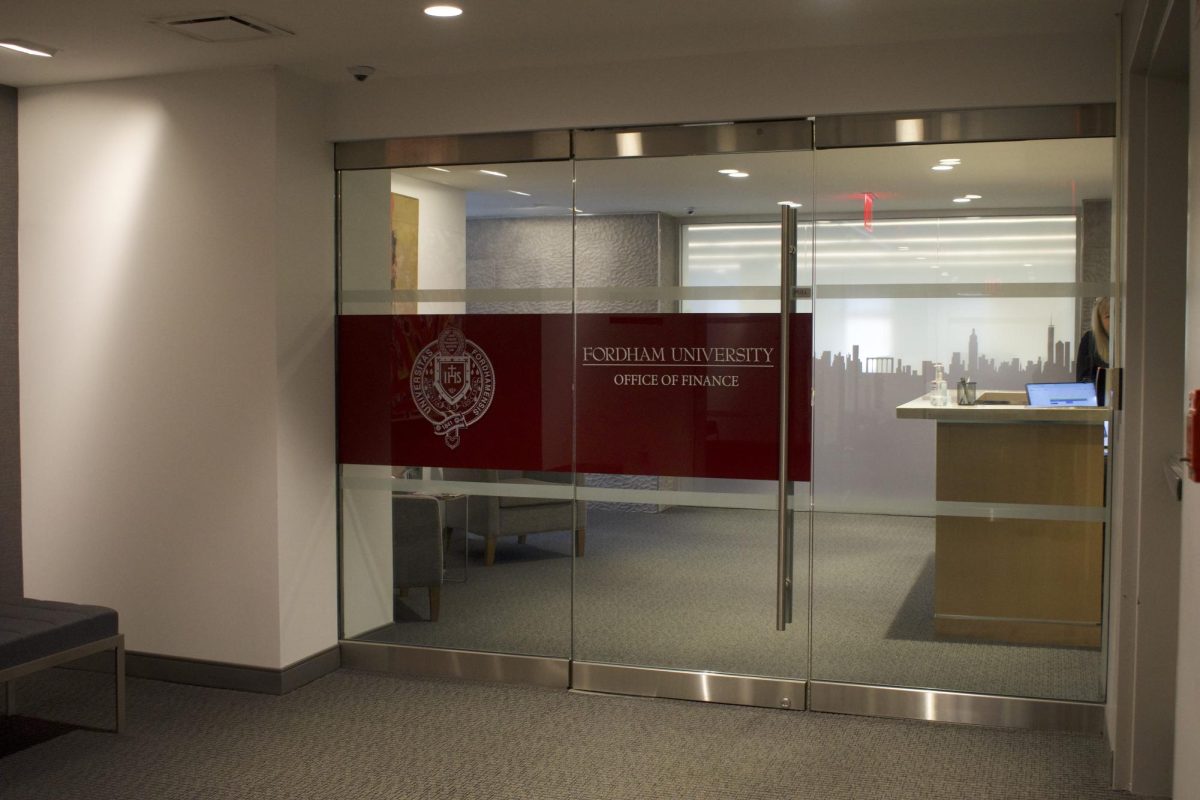Fordham CFO Tokumbe Shobowale announced a hiring pause and reduced departmental spending due to a “forecast budget deficit” in the 2026 fiscal year in an email sent to all faculty on March 14.
Shobowale cited the uncertain future of federal higher education funding and the graduation of Fordham’s largest undergraduate class this May as the key factors driving the expected deficit. Fordham also recently cut student work-study hours to a maximum of 10 hours per week.
Shobowale wrote exceptions may be considered to the hiring pause. Position requests will undergo review by the relevant administrator and, afterward, by the president’s Cabinet. Shobowale wrote that the announced measures balanced financial and academic priorities.
“We must take proactive steps to ensure financial stability without compromising the core mission of the University,” Shobowale wrote.
Diane George, co-chair of Fordham Faculty United (FFU), said she was skeptical that the measures put educators first.
“Isn’t the core mission of the university teaching? So, teaching needs to be supported, teachers need to be supported,” George said.
The reduced department spending aims to minimize non-staff expenses. Shobowale requested that all departments cut 10% of their current spending. George teaches in sociology and anthropology and said the cuts may disproportionately affect departments with smaller budgets.
“I know that our department budget is very small anyhow, so I am not sure what we’re going to cut,” George said. “We do not even have notepads in our department anymore.”
Kari Evanson, the other co-chair of FFU, said she had similar concerns that budgets, which had already been cut in the 2008 recession and COVID-19 pandemic, will not be restored.
“It is kind of the same pattern as with inflation. Inflation costs go up, they never actually come back down, they just stop going up as exponentially. And so it has kind of been the same with budgets. Budgets get cut, but then they never get reestablished,” Evanson said.
Evanson said budget cuts affect students and faculty while “administrative bloat” alone causes an imbalance between academic departments and administrative costs.
“I think that balance follows a pattern across higher education that, as funding is cut for instructional resources and research, as it is cut for faculty and some of those resources are then cut for students, but the administrative salaries are not cut, and often raised,” Evanson said.
“We need more money because we also live in New York City and operate in New York City and have to deal with inflation. So they can use that as an excuse to raise tuition, which they did last year, and the year before, but we can’t use that to justify higher salaries for ourselves.” Diane George, co-chair of Fordham Faculty United
George specifically identified the hiring of academic advisors as an unnecessary expense that does not benefit students’ educations.
“They have added this huge salary compensation expense to their budget and I am not sure that it is actually helping,” George said.
George also expressed frustration at what she perceives as a lack of transparency from Fordham regarding the state of their finances, despite claims of financial difficulties.
“Our position is, okay, show us your finances, and if it is truly a crisis, we are part of the Fordham community. We support the students. We want resources going towards student learning and education, but they will not show us their finances. So they say they do not have money but there’s never any hard evidence of that,” George said.
Shobowale and Vice President for Communications Bob Howe were not immediately available for comment.
Fordham is not alone in implementing new budgetary measures. There have been a slew of similar fiscal policies at universities across the country. Harvard University, for example, which possesses the largest endowment in the world at approximately $52 billion, instituted a hiring freeze on March 10, along with other spending cuts. Fordham has an endowment of approximately $1 billion. North Carolina State University, Stanford University and the University of Louisville have also ordered hiring pauses.
Shobowale cited the uncertain future of federal higher education funding and the graduation of Fordham’s largest undergraduate class this May as the key factors driving the expected deficit.
The Trump administration has recently issued attacks on higher education, attempting to shut down the Department of Education. They have also canceled $400 million of federal funding from Columbia University due to “continued inaction in the face of persistent harassment of Jewish students” and withheld $175 million from the University of Pennsylvania over the school’s policies toward transgender athletes. The administration is considering raising the excise tax on university endowments to 14% and lowering the National Institute of Health’s research grants to 15%.
Columbia’s recent compliance with federal demands has exacerbated concerns over the future of academic freedom, and higher education as a whole, as federal funding continues to be weaponized. Despite this, George said University President Tania Tetlow stated in a recent faculty meeting that “Fordham would probably not be as affected by the cuts to federal funding as other schools.”
These financial uncertainties may pose difficulties for upcoming contract negotiations between FFU and the university. FFU represents both adjunct faculty — which make up a majority of the union — and non-tenure full-time professors. FFU is demanding more robust academic protections, a no-strike no-lockout clause (prohibiting both strikes by the union and lockouts by the university) and a reduction of the probationary period before presumption of reappointment for adjunct faculty. Adjuncts are capped at two classes per semester, so the probationary period generally lasts four to five years. Administration said no to the first two proposals, and will provide a counter-proposal to the third during the next bargaining session on March 26.
Adjuncts at Fordham, due to their teaching cap, make a maximum of $40,000 per year.
The co-chairs said they were “very disappointed” that Fordham brought in an outside lawyer from the Jackson Lewis Firm, which George characterized as having a “national reputation for being a union-busting firm.”
Evanson agreed, adding that this decision came as an additional blow due to the union’s positive relationship with administration.
“I wanted to add that this is disappointing to us because we work very well with the administration,” Evanson said. “We feel that the negotiations would run more smoothly if we could continue this direct discussion with the Fordham administration.”
George added that Fordham’s messaging of financial difficulties is hardly new. She believes the university’s claims of having to cut budget costs due to inflation and high operating costs in New York City are hypocritical.
“We need more money because we also live in New York City and operate in New York City and have to deal with inflation. So they can use that as an excuse to raise tuition, which they did last year, and the year before, but we can’t use that to justify higher salaries for ourselves,” George said.
The email informing faculty members of the budgetary measures was sent shortly after FFU’s first negotiation session.
In 2023, Tetlow cited inflation, lingering effects from the pandemic and faculty pay increases as prompting the 6% tuition increase for the 2023-2024 academic year. Fordham cited similar reasons again for the 4.4% increase for the 2024-2025 academic year.
George said that Fordham faculty are not asking for “high salaries,” but rather, salaries that get them “slightly closer to the cost of living in New York.” Adjuncts at Fordham, due to their teaching cap, make a maximum of $40,000 per year, according to George, which she said is “not a living wage.”
The co-chairs also said that Shobowale has a history of union-busting behavior. Shobowale was hired as Fordham CFO in Sep. 2023. Before that, he spent 10 years as the executive vice president of business and operations at The New School (TNS) before he resigned from his position shortly after TNS faculty went on strike in fall 2022.
The part-time and adjunct faculty, who make up around 90% of the university, effectively shut down the school in a three-week long strike for higher pay. The strike was accompanied by a storm of media coverage and a barrage of emails from parents threatening a class-action lawsuit.
“Isn’t the core mission of the university teaching? So, teaching needs to be supported, teachers need to be supported.” Diane George, co-chair of Fordham Faculty United
George said Shobowale’s track record at TNS indicates that “this is going to be a difficult negotiation.” The email informing faculty members of the budgetary measures was sent shortly after FFU’s first negotiation session, which George believes was intentional.
“Those negotiations were protracted … Yes, there are other things going on besides our negotiations, but I think the timing is a little calculated,” George said.
Like Fordham, TNS hired an external lawyer with a reputation for union-busting during the fall negotiations, according to Lee-Sean Huang, an adjunct professor of graphic design at TNS who dealt with media relations for the TNS adjunct faculty union during the strike. Huang said universities “cry poverty” to avoid paying faculty what they’re worth.
He referred to a disagreement between Shobowale and Sanjay Reddy, an economic professor at TNS, in 2022. Reddy published an analysis of TNS’s finances during the strike, resulting in a public dispute on social media regarding the university’s economic stability, according to Huang.
“I’m not an expert on finances. I can’t tell you what was going on, but there’s the expertise of somebody who went to business school versus somebody who has a PhD and is a professor in economics, and supposedly they both know numbers,” Huang said. “And it does behoove the university to present themselves as poorer than they really are because then, obviously, the way that they play their game is they want to pay us as little as possible and get away with it.”
Shobowale acknowledged the seeming incongruity of Fordham’s budgetary cuts arriving despite the recent $100 million gift, the largest donation the university has ever received. Shobowale wrote that it will be used for a new facility, rather than to offset the forecasted budget deficit.
“Like gifts from many of the University’s largest benefactors, it was made to support new initiatives that significantly strengthen Fordham’s future—in this case, primarily the construction of a new building—not to cover the cost of ongoing operations,” Shobowale wrote.
Further budgetary measures and adjustments may continue to be implemented.
CORRECTION: A previous version of this article incorrectly wrote Kari Evanson’s last name as “Evans”. The article has been updated to reflect the correct name.



